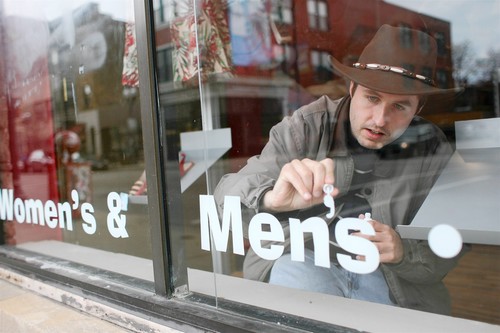Okay, so this kind of sucks. A fellow named Jeff Deck, founder of the Typo Eradication Advancement League (TEAL), quit his job at MIT and went with his friend Benjamin Herson on a cross-country journey to correct typos on public signage:
What started as a wacky, quixotic adventure, covered by NPR, the Chicago Tribune and others, went South, or, rather, Southwest, in a hurry. On March 28th, Jeff and Benjamin corrected typographical errors on a 60-year-old, hand-painted sign at the Grand Canyon National Park (corrections not depicted):
Christopher A. Smith, a National Park Service agent (so much more respectful than Cactus Fuzz or Tree Pig), stated in an affidavit that investigators discovered that Deck and Herson were responsible via Deck’s own blog, which chronicled their exploits. Deck and Herson pleaded guilty and were sentenced to a year’s probation, during which they are banned from entering national parks, or modifying public signs. They were also ordered to pay $3,035 to repair the sign.
Having a mild obsession with signage myself (previously, previously, previously), I salute Jeff and Benjamin’s philosophy and mission, but I wonder if they feel, in hindsight, that they crossed a line. Jeff’s blog is currently dark, only stating, “Statement on the signage of our National Parks and public lands to come,” but there is still a gallery depicting some of their accomplishments.
Whether or not one has a problem with what they did depends on how one determines the value of a thing. One might argue that the sign in question has intrinsic value as art, whereas a restaurant sign with movable letters does not. The woman who painted the sign was Mary Elizabeth Jane Colter, the architect of the Watch Tower that the sign describes.
One could also argue that certain typos make documents unique, such as is the case with the numerous typesetting errors that gave rise to some highly collectible (and amusing) editions of the Bible, or the typos in the United States Constitution.


Deck was wrong for correcting the sign. There’s a simple word for this activity: “vandalism”. Allow me to explain.
First, we need to separate two different things that are going on. His personal mission to correct mistakes in language and his quirky desire to make a public statement doing so. I don’t think there’s anything wrong with that, and the whole idea strikes me as kind of neat too.
Then there’s the unavoidable angle that he’s altering someone else’s property without their consent or knowledge. That is vandalism.
Indulge me in a small thought experiment. Suppose that there’s an 17-year old free spirit named Kayla, who has recently converted to Hare Krishna. She is sincere and fanatical in her devotion to something that gives many thousands of people joy and meaning in their lives. She comes up with an idea that’s part performance art, part religious devotion, and part mischeivous fun. She decides to tour across the Christian USA and replace occurrences of “god” with Krishna everywhere she sees them.
Nothing is safe…Japanese temples are reduced to bragging about their “Pakrishnas”. Local theatrical companies discover, to their amazement, that they are actually staging the play “Waiting for Krishnaot” this Friday night. Baptist church signs are reduced to utter chaos.
Kayla is a great person, and a good spirit, (even if many may think her belief system is extremist, nutty, or both) but what exactly gives her the right to be fucking with other people’s shit? Shit that they paid for, put up on their property, and that reflects on them and their reputation? Her freedom of speech doesn’t extend to other people’s microphones and signage.
So what’s the difference between Deck and Kayla?
mrpikes reply on August 26th, 2008 6:10 am:
To answer your question straight, the difference between Deck and Kayla is that Deck’s actions actually improves a given sign’s quality of conveying information, whereas Kayla’s actions degrades it. I agree with you that it’s vandalism either way, and that neither Deck nor Kayla have an actual right to change signage. And, although “Pakrishnas” and “Waiting for Krishnaot” are funny, I think I would probably feel compelled to slap Kayla silly, in a free-spirited kind of way.
mrpikes reply on February 3rd, 2009 1:40 pm:
Foo
Why should that matter? If you have a sign on your property saying “NO TRESPASSING – VIOLATORS WILL BE PROSECUTED”, and I change it to “NO TRESPASSING – PROSECUTORS WILL BE VIOLATED” for humor value, is that OK on the basis of your sign’s lack of artistic content?
Why should that matter? Could I further bolster my argument in favor of defacing your sign by arguing that your sign is common, not unique, and not particularly valuable? Who exactly gets to make those determinations about your property for you?
mrpikes reply on August 26th, 2008 6:36 am:
I had no idea that this was such a highly charged issue for you. 🙂 My point was that while there is no real harm in fixing a grammatical error on a restaurant sign, for example, one can make a clear distinction between that and, say, welding an additional “n” on to “Pensylvania” on the Liberty Bell. I do not consider the former to be defacement per se, while the latter would get you hard time. I know, I know, that’s “appeal to consequences.” In neither case does Deck have the “right” to alter something that isn’t his, but there simply isn’t any harm done in the former example. And since we’re totally going to go out and do this, I suggest that you make peace with your philosophical reservations.
Gokmop–If the question before us is “Is it ‘Vandalism’ according to criminal code,?” then the answer is a simple ‘Of course.’ It is similarly simple to take a moral tack and so argue that the typo-saboteurs are culpable and morally wrong. So they’re bona-fide law-breakers. So are jay-walkers. But now we have accomplished what? This question has already been settled by the general public, law enforcement, and the law-breakers themselves.
The Yes-Men, who premeditatedly impersonate, misrepresent and satirize corporate gliterati during public events in order to draw attention to the social crises of our time are also no doubt acting illegally. They are hijacking the proprietary right of those officials to represent themselves, not to mention their right not to be misrepresented. They are cunning, creative and conscious. The only reason the corporations don’t sue them after the jig is up is that they don’t want to suffer further embarrassment and continued bad publicity.
Additionally, the Yippies were fully aware they had no permit when they surrounded the Pentagon in the late 1960’s, holding hands in a circle, and attempting to exorcise the institution of its evil spirits. Nor were they surprised when they were arrested.
And this past spring, the climbers who scaled the Golden Gate Bridge to hang a “Free Tibet” sign in advance of the Beijing Olympics knew better than anyone that when they descended the cables they would be provided free transportation via police cruiser to the San Francisco police headquarters to be charged legally.
And what about the insidious “Rest Area Ninja” who change the directions on the hand-dryer from “Push Button” to “Push Butt?” Among my longer than necessary list of illustrative examples, these poor hacks would most certainly make the prison inmate “Bitch List.”
This is speculation on my part, but I estimate that all of the civil disobedients described above have these things in common (excluding The Ninja): 1) They are typically law-abiding 2) They took stock of what consequences they might be facing in advance of their actions and 3) They also decided in advance that the potential net result of their behavior (raising public consciousness, biggering their own reputation, etc) was worthwhile and exceeded the discomfort of whatever legal consequences they might face.
So this is all to say I think questions and responses about illegality are not at the essence of what is important with Deck, Benjamin and TEAL. They would likely stipulate that what they did was illegal. In fact, they pled guilty. My guess is that their website will soon make a very big deal over their most recent escapade. Their awareness doesn’t make it “right,” but I think it covers that base sufficiently to allow us to move on to more interesting questions.
So in other words, the “legal vs. illegal” axis is a legitimate axis, and there are countless examples of actions which are illegal, but which beg assessment on other axes, axes such as…
1) The degree to which they are serving some public good vs. The degree to which they are acting out their own flaming narcissism
2) The degree to which saboteurs like these are an inevitable by-product of a nation with a true literacy crisis vs The degree to which the saboteurs are simply Word Snobs who might have launched this project even if the literacy rate were triple what it is today.
3) The degree to which their emergence is part of a growing cultural trend in which activism is part of our collective repertoire vs The degree to which I personally hope that’s the case, when in fact their project is just a project.
So, understanding that we’re all armed with precious little information to undertake the questions above, what would be your best estimate as to where Deck, Benjamin and TEAL score on the above spectra (scale of 10)? Here’s mine…
1) Public Good: 4 Flaming Narcissism: 5
2) Public Crisis: 4 Word Snobs: 6
3) Cultural Trend: 4 Just a Project: 7
4) Opining Endlessly While on Vacation: Priceless